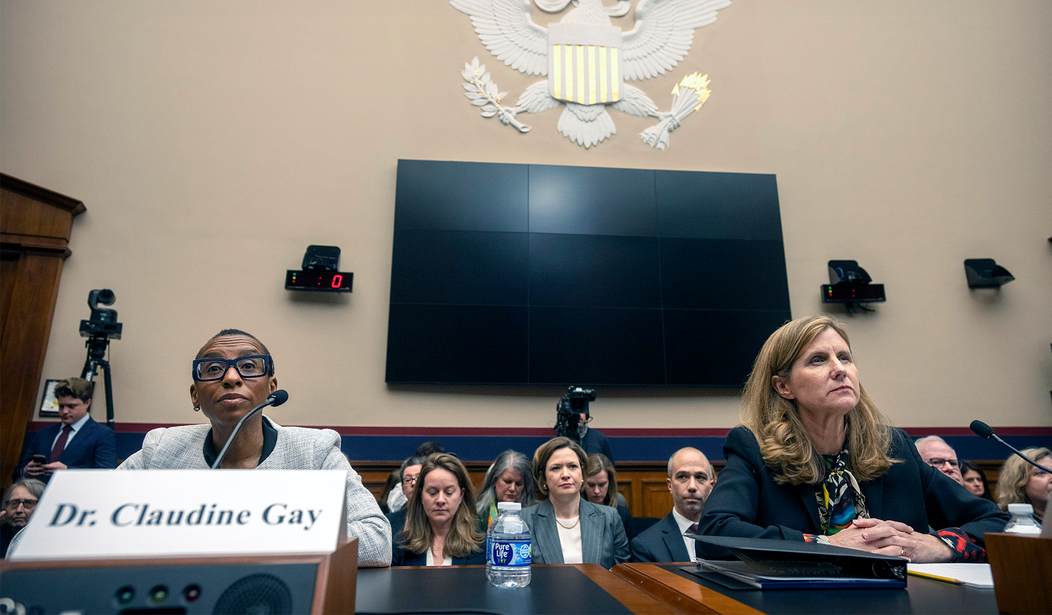Saturday, Liz Magill tendered her resignation as president of the University of Pennsylvania after she and the presidents of Harvard and MIT embarrassed themselves in front of the House Committee on Education and the Workforce. When asked whether calls for the genocide of Jews would violate Penn’s bullying and harassment policies, Magill proferred that “if the speech turns into conduct, it can be harassment,” calling it “a context-dependent decision” — tacitly saying that genocidal language is only harassment if actually carried out. Harvard president Claudine Gay gave a similar answer. Even at schools with the deepest commitment to freedom of expression and open inquiry, such a statement could be a step too far. But coming from UPenn and Harvard, which rank second-to-last and dead last respectively in the most recent college free speech rankings from the Foundation for Individual Rights and Expression (FIRE), the claim is unthinkable.
Treating the balance between freedom of expression and threats of violence as “context dependent” inevitably devolves into double standards, and that is the reason for Magill’s fall and her peers’ perilous position. Unless they stop pandering to every possible audience and make firm commitments in each domain, Magill’s counterparts around the country open themselves up to the same fate, damaging the credibility of American higher education in the process.
The conflicting priorities at work leave university presidents with the unenviable task of defining the lines between discourse and harassment. Since October 7, the U.S. Department of Education’s Office for Civil Rights has opened investigations into thirteen institutions of higher learning for discriminating on the basis of shared ancestry, with most of these cases relating to antisemitism. While this may seem like small potatoes in a nation of about four thousand colleges, prestigious schools are disturbingly overrepresented: The list boasts four official members of the Ivy League (Harvard, UPenn, Columbia, and Cornell). Also on the list are the swanky women’s college Wellesley, highly-ranked Tulane, and the Cooper Union, where Jewish students were barricaded inside a library during an anti-Israel protest in October. Antisemitism is despicable no matter where it occurs, but its conspicuous presence at some of the most influential institutions in America must be addressed.
Recommended
Unfortunately, the problem isn’t as simple as punishing, firing, or expelling antisemites. Private universities are not strictly bound by the First Amendment as public universities are. However, many schools at least claim to foster an environment of free speech and open discourse, and this laudable goal carries with it an obligation to consistently and fairly adjudicate when speech turns into bullying, harassment, or incitement.
Ms. Magill and company could be forgiven for mishandling recent events if this were the first time their schools had faced this balancing act. But it wasn’t, and the inconsistency in their behavior is striking. In 2017, tenured UPenn professor Amy Wax co-authored an op-ed that praised “bourgeois culture” of the mid-20th century and suggested that not all cultures are equally successful. This led to calls for her removal from teaching first-year courses, which the university eventually enforced. Last year, she faced a 12-page complaint by the dean of the law school calling for sanctions against her over her views on immigration and race. In its own recent history, Harvard rescinded the acceptances of 10 students in 2017 over obscene memes in private Facebook groups. In 2019, it revoked its offer of admission to Parkland shooting survivor Kyle Kashuv for racial slurs in text messages from when he was 16.
All of these are radical overreactions inconsistent with freedom of expression, for far less than the calls on Harvard’s campus to “globalize the intifada,” — widely seen by Jewish groups as “calls for genocide and anti-Jewish violence throughout the world.” Given the fire with which administrators like Claudine Gay have reacted to other events in the news (such as the killing of George Floyd), it seems clear that genocidal and antisemitic slogans should have set off alarm bells in the Ivy League.
Between students, donors, and left-wing faculty, a university president serves many masters, and it’s hard not to feel at least a twinge of sympathy for Liz Magill in her failure to save face with such a broad group. However, there is no excuse for the inconsistency with which antisemitism has been treated.
Restricting antisemitic rhetoric would not solve this problem, and may even be counterproductive. Instead, cases of true harassment need to be dealt with fairly, and freedom of speech needs to be protected for all, rather than only for those to the left of Stalin. There is much more at stake than just the careers of the leaders of our most prestigious universities; the credibility of higher education is on the line.
Mike Viola is a writer for Young Voices. He has worked in data and development with various pro-liberty think tanks. Follow him on X: @mf_viola.
























Join the conversation as a VIP Member